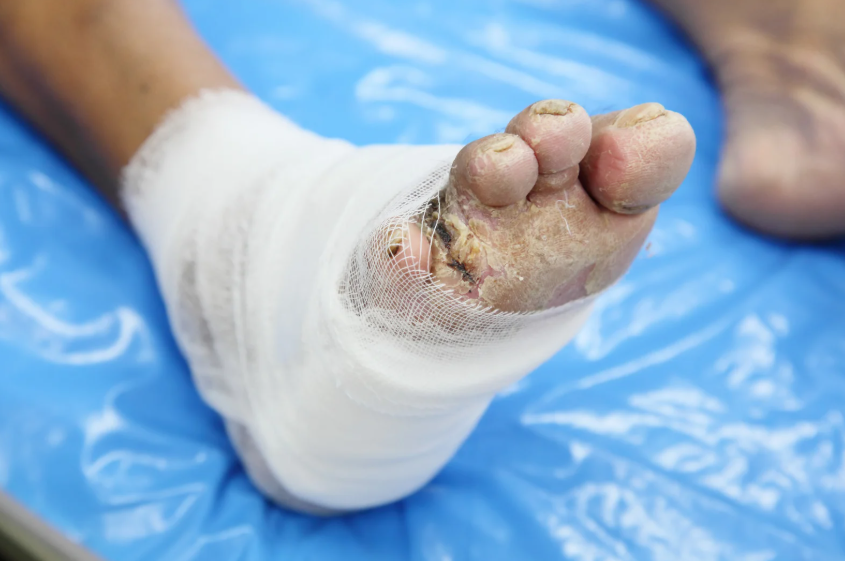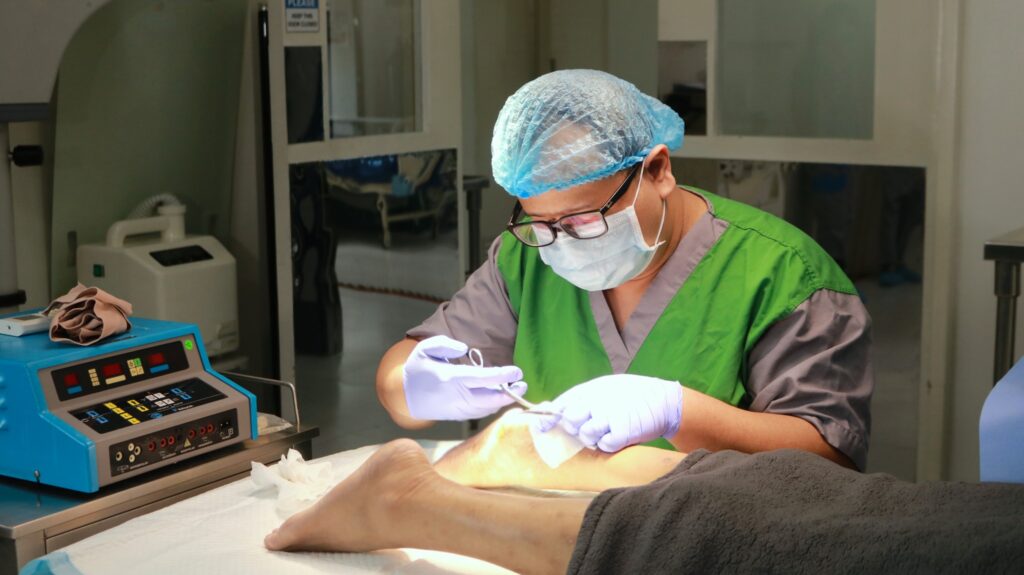Forefoot ulcers are one of the most common and troublesome complications for individuals with diabetes and poor circulation. These chronic wounds can occur due to prolonged pressure on the forefoot, often exacerbated by neuropathy, resulting in a lack of sensation. When left untreated, these ulcers can become infected, leading to more serious conditions such as gangrene or even amputation. Orthopedic treatment for forefoot ulcers plays a vital role in managing these wounds by addressing both the causes and the complications associated with their healing.
Diabetic foot ulcers, a major contributor to chronic forefoot ulcers, require immediate attention and proper care to prevent them from worsening. Often, traditional treatments may not be sufficient, and that’s where orthopedic treatment for forefoot ulcers comes into play. Addressing the biomechanical factors that contribute to ulcer formation can significantly improve healing outcomes and quality of life.
Understanding the Causes and Risks of Chronic Wounds in the Forefoot
The causes of chronic forefoot ulcers are multi-faceted. Commonly, they arise from prolonged pressure, such as from ill-fitting shoes, and are worsened by underlying conditions like peripheral neuropathy. For individuals with diabetes, the lack of sensation in the feet makes it difficult to feel pain or discomfort, often leading to the development of ulcers. Orthopedic treatment for forefoot ulcers focuses on addressing these mechanical factors, such as abnormal pressure points, which is essential for effective healing.
In addition to pressure, poor circulation due to vascular disease can impede the body’s ability to heal chronic wounds. These ulcers are often slow to heal because of insufficient blood flow. Regular consultation with an orthopedic specialist, such as Tec Orthopedics, can help identify and correct these factors, allowing for more effective management and treatment of chronic forefoot ulcers.
Traditional Wound Care vs. Orthopedic Interventions
Traditional wound care, which includes dressing changes and infection control, is essential for the management of chronic forefoot ulcers. However, it may not be sufficient in cases where the wound is caused or exacerbated by mechanical factors such as excessive pressure or abnormal foot alignment. Orthopedic treatment for forefoot ulcers involves a more comprehensive approach, addressing these mechanical factors through techniques like custom orthotics, footwear modifications, and offloading devices.
While general wound care is crucial, Tec Orthopedics understands that long-term ulcer management requires addressing the root causes. Without proper pressure relief and proper foot alignment, forefoot ulcers are likely to return, making it necessary to incorporate orthopedic treatment alongside traditional methods for optimal results.
How Orthopedic Treatment Supports Wound Healing
The role of orthopedic treatment for forefoot ulcers is pivotal in supporting the healing process. Orthopedic specialists, such as those at Tec Orthopedics, can design custom orthotics and prescribe specific footwear that relieves pressure on the affected area, allowing the ulcer to heal without further trauma. These treatments help distribute weight more evenly across the foot and reduce stress on the forefoot, thus preventing additional injury.
Moreover, orthopedic interventions like offloading devices—such as Total Contact Casts or specialized boots—are crucial in immobilising the foot and promoting healing. These treatments not only protect the wound but also help improve circulation, which is essential for healing chronic ulcers. By addressing the mechanical factors that contribute to chronic forefoot ulcers, orthopedic treatment for forefoot ulcers accelerates healing and reduces the risk of recurrence.
Surgical and Non-Surgical Orthopedic Approaches
In some cases, orthopedic treatment for forefoot ulcers may require surgical intervention. If the ulcer is deep or involves underlying structures such as tendons or bones, surgery may be necessary to remove damaged tissue or correct foot deformities that contribute to ulcer formation. Surgical options, such as tendon release or bone reshaping, can help improve foot mechanics and prevent future ulcers.
On the other hand, non-surgical orthopedic approaches also play a crucial role in managing chronic forefoot ulcers. For instance, custom footwear, orthotic insoles, and specialized wound care products are essential in offloading pressure and promoting healing. Tec Orthopedics offers both surgical and non-surgical solutions, tailoring treatment plans to the patient’s specific needs and ensuring the most effective care for forefoot ulcers.
Preventing Recurrence of Forefoot Ulcers
Preventing the recurrence of forefoot ulcers is as important as treating the existing wound. One of the key components of orthopedic treatment for forefoot ulcers is education on proper foot care and the use of preventive measures such as custom orthotics, pressure-reducing footwear, and regular foot inspections. Tec Orthopedics offers comprehensive guidance on how to prevent the formation of new ulcers by addressing foot deformities and providing solutions to reduce pressure on vulnerable areas of the forefoot.
In addition to these orthopedic treatments, patients are encouraged to maintain good blood sugar control, improve circulation, and engage in proper foot hygiene. By working with an orthopedic specialist, individuals with chronic forefoot ulcers can significantly reduce the risk of ulcer recurrence and maintain healthy, functional feet.
When to Consult a Specialist
If you or someone you know is suffering from chronic forefoot ulcers, it is essential to seek expert care as soon as possible. Orthopedic treatment for forefoot ulcers can help prevent complications and speed up recovery, but only if the underlying mechanical issues are addressed. If a wound does not heal despite standard care, or if there is persistent pain, infection, or signs of deformity, it’s time to consult an orthopedic specialist.
Tec Orthopedics provides expert consultation for individuals dealing with chronic forefoot ulcers. Their team of specialists will evaluate your foot mechanics, assess the ulcer, and recommend a personalized treatment plan that can help you heal faster and prevent future issues.
Integrating Orthopedic Care for Long-Term Healing
Orthopedic treatment for forefoot ulcers is essential for individuals with chronic wounds, particularly those related to diabetes or poor circulation. By addressing the biomechanical factors that contribute to ulcer formation, orthopedic specialists can help prevent recurrence, promote faster healing, and improve overall foot health. Through a combination of surgical and non-surgical treatments, along with expert guidance on prevention and care, individuals with chronic forefoot ulcers can regain mobility and enjoy a higher quality of life.
If you are struggling with chronic forefoot ulcers, consult with a trusted orthopedic specialist at Tec Orthopedics. Their expertise in managing chronic wounds and preventing recurrence can make a significant difference in your healing journey.






